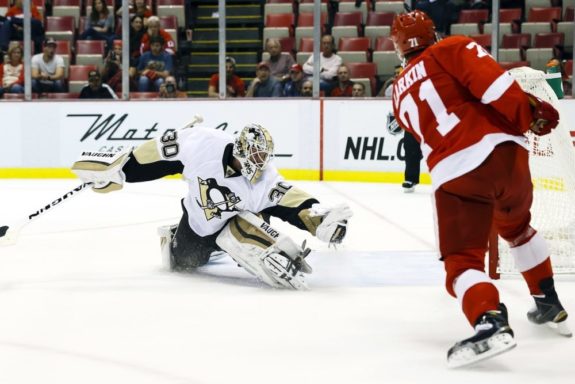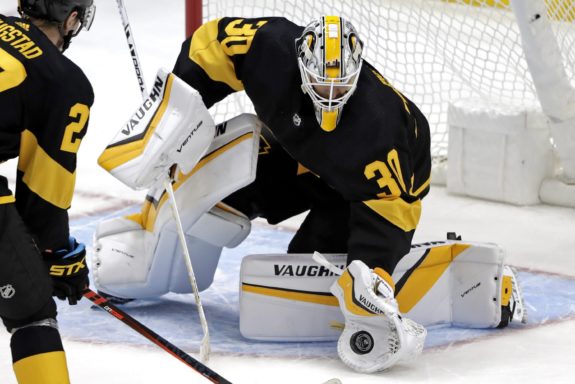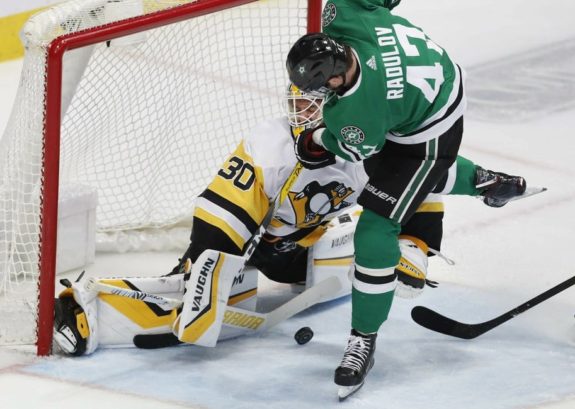Matt Murray has been the anchor in goal for the Pittsburgh Penguins since his debut on Dec. 19, 2015. When healthy, he is one of the best netminders in the league. He enters this season on the last year of his deal and there seems to be no rush for general manager Jim Rutherford to re-sign him. But should he try to get a deal done soon? There is a lot of evidence to say that he should.
Matt Murray: Two-Time Stanley Cup Champion
At the 2012 NHL Entry Draft in Pittsburgh, the Penguins selected the Canadian goaltender that led to them to back-to-back Stanley Cups, all while the franchise goalie (Marc-Andre Fleury) was still in town and playing well. Murray was selected in the third round and made his debut a few years later. Despite only starting nine games in the 2015-16 regular season, he started 21 playoff games and led the Penguins to their first championship since 2009.

Murray only appeared in 15 regular season games in the 2015-16 season, so by NHL standards, the upcoming 2016-17 season was his rookie season. Even though he was technically a rookie, the Penguins did not wait to extend his contract and gave him a three-year extension with an average annual value (AAV) of $3.75 million. That season, the 22-year-old Murray started 49 games and had a goals-against average (GAA) of 2.41 and four shutouts. An injury late in the regular season prevented him from playing in the first two rounds of the playoffs. It wasn’t until Game 4 of the Eastern Conference Final that Murray got his chance to start in the 2017 Stanley Cup Playoffs and he never looked back. He played in 11 games and had a GAA of 1.70 and a .937 save percentage (SV%). The highlight for Murray was posting shutouts in Games 5 and 6 of the Stanley Cup Final against the Nashville Predators.
Murray had just led the Penguins to a second consecutive Stanley Cup. But with the Vegas Golden Knights having an expansion draft following the 2016-17 season, there was still some doubt as to which direction the Penguins would go due to a No-Trade Clause (NTC) in longtime goaltender Marc-Andre Fleury’s contract. Ultimately, Fleury waived his NTC and was selected by the Golden Knights. This paved the way for Murray to be the starting netminder for the foreseeable future.
New Contract Starts: Regression Happens
Murray was unable to put up the same kind of numbers in the next two seasons that he did as a “rookie.” His goals-against average went up. His save percentage went down. Injuries started piling up and he was labeled “injury prone.” Even though he started 49 and 50 games in the next two seasons, a normal amount for a No. 1 goalie, he still went through phases of being on injured reserve. When healthy, he often started multiple games in a row, something teams like avoiding to keep their starting goaltenders fresh for a playoff push.

With two early playoff exits in the last two seasons by the Penguins, fans have begun to question whether or not paying Murray is the right thing to do. When he is on top of his game, you can argue he is one of the best goalies in the NHL. But when he is off, he is off. He will go through stretches where he is the most dominant goalie in the league and then have a few bad games in a row. Consistency the last two seasons has been tough for him to find.
Murray is due $3.75 millionin the final year of his contact. Based solely on AAV, Murray will be the 25th-highest paid goalie. Considering all he has done in his NHL career to this point, this is absolutely a steal for the Penguins.
How Much Does Murray Command?
Luckily, the Penguins have a bit of leverage with Murray because he is a restricted free agent (RFA). He is arbitration eligible, meaning there could be an independent hearing to decide what his salary would be. Generally, these hearings do not happen because teams agree to a new contact with that player.

The days of getting a goaltender, especially one the quality of Murray, to agree to a team-friendly deal are over. They have realized the value they have and goaltenders are signing much bigger contracts than in the past. Recently, four top goaltenders have signed new deals to give us a framework as to what to expect for Murray’s next contract:
- Andrei Vasilevskiy– 8 years/$76 million ($9.5 million AAV)
- Sergei Bobrovsky– 7 years/$70 million ($10 million AAV)
- John Gibson– 8 years/$51.2 million ($6.4 million AAV)
- Connor Hellebuyck– 6 years/$37 million ($6.167 million AAV)
All four have one thing that Murray doesn’t: they have all been finalists for the Vezina Trophy, awarded to the NHL’s best goaltender. Vasilevskiy and Bobrovsky have both won the trophy. Murray has something that the four above do not have, a Stanley Cup. If we go by these numbers, Murray will likely get a contract with an AAV somewhere between $6.167 million and $10 million.

Using these four goaltenders as a framework, Murray, a 25-year-old goaltender, should receive an eight-year contract extension, which is the maximum a player can sign. The Penguins will likely use his injury history as a reason to pay him closer to the low end of that scale. They can also use his up and down play in the last two seasons as a reason for paying him less.
Murray has one major bargaining chip: he is a two-time Stanley Cup champion. With a career .917 SV% and 97 wins in 155 career regular-season starts, he has earned the raise he is due. The best guess is that he will make more than Gibson and Hellebuyck but less than Bobrovsky and Vasilevskiy due to recent performances. I think an eight-year deal with an AAV in the $7.5-$8 million range is what Murray will command.
Sign Him Now Instead of Later
Signing Murray now instead of either midway through the season or after will ultimately benefit the Penguins. A deal done now should remove the drama and speculation he can expect this season, when he will inevitably be asked, after a stellar performance or a sub-par one, how this will affect his contract negotiations. The Penguins may want to see him prove his value and if he has a down season, they could sign him for cheaper than he deserves.

What if Murray has a career year? What if he leads the Penguins to a third Stanley Cup in five seasons? What if he is finally a Vezina Trophy finalist, or better yet, wins the Vezina? All of a sudden, he creeps toward that $10 million per year or potentially even higher. The salary cap implications of this kind of deal could hurt the Penguins in future seasons.
The argument can be made for the Penguins to wait and see but I’m not sure how that helps the team. If he does poorly, he will still command $6 million per year. If he has a career year, they will have to pay him more than they probably want to. Signing Murray now will put all speculation to bed and allow him to see that the team has all the confidence in the world in him. He could get fair value for what he has done and how good he can be but also could save a few million dollars per season that the team can invest in other areas of the team.